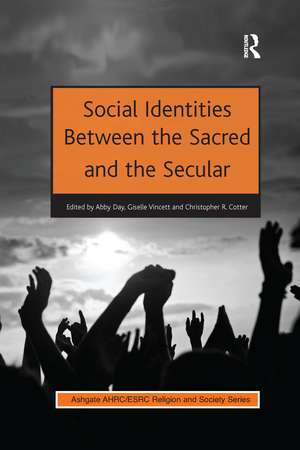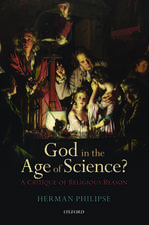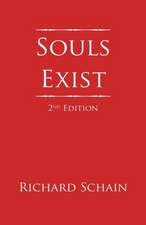Social Identities Between the Sacred and the Secular
Editat de Abby Day, Giselle Vincett, Christopher R. Cotteren Limba Engleză Paperback – 28 oct 2016
| Toate formatele și edițiile | Preț | Express |
|---|---|---|
| Paperback (1) | 338.33 lei 6-8 săpt. | |
| Taylor & Francis – 28 oct 2016 | 338.33 lei 6-8 săpt. | |
| Hardback (1) | 850.17 lei 6-8 săpt. | |
| Taylor & Francis – 12 aug 2013 | 850.17 lei 6-8 săpt. |
Preț: 338.33 lei
Preț vechi: 386.78 lei
-13% Nou
Puncte Express: 507
Preț estimativ în valută:
64.74€ • 67.60$ • 53.46£
64.74€ • 67.60$ • 53.46£
Carte tipărită la comandă
Livrare economică 15-29 aprilie
Preluare comenzi: 021 569.72.76
Specificații
ISBN-13: 9781138272286
ISBN-10: 1138272280
Pagini: 256
Dimensiuni: 156 x 234 x 20 mm
Greutate: 0.45 kg
Ediția:1
Editura: Taylor & Francis
Colecția Routledge
Locul publicării:Oxford, United Kingdom
ISBN-10: 1138272280
Pagini: 256
Dimensiuni: 156 x 234 x 20 mm
Greutate: 0.45 kg
Ediția:1
Editura: Taylor & Francis
Colecția Routledge
Locul publicării:Oxford, United Kingdom
Notă biografică
Dr Abby Day is a Senior Research Fellow at the University of Kent where she teaches the anthropology of religion. Her qualitative longitudinal research has expanded conventional views of belief and belonging through empirical research based initially in the UK and extended through cross-cultural comparisons. She and Prof. Gordon Lynch organised the AHRC/ESRC Religion & Society Project 'Young People and the Cultural Performance of Belief'. Her latest book, Believing in Belonging: Belief and Social Identity in the Modern World was published in October 2011. She also edited the Ashgate collection, Religion and the Individual, 2008.
Dr Giselle Vincett was research fellow at the University of Edinburgh 2007-2011, primarily working with Dr Elizabeth Olson on two AHRC/ESRC Religion & Society projects, 'Relational Religious Identities' and 'Marginalised Spiritualties: Faith and Religion Among Young People in Socially Deprived Britain'. She also co-edited Women and Religion in the West and The Changing Face of Christianity for Ashgate.
Christopher R. Cotter is completing doctoral work in Religious Studies at Lancaster University, UK. His theoretical work focuses upon the lived relationships between the concepts of ’religion’, ’non-religion’, and the ’secular’, and his wider interests centre around New Religious Movements, qualitative methods, theories of religion, and Religious Studies as a discipline. Chris has published on contemporary atheism and non-religion, is Managing Editor at the Nonreligion and Secularity Research Network and co-founder of The Religious Studies Project.
Dr Giselle Vincett was research fellow at the University of Edinburgh 2007-2011, primarily working with Dr Elizabeth Olson on two AHRC/ESRC Religion & Society projects, 'Relational Religious Identities' and 'Marginalised Spiritualties: Faith and Religion Among Young People in Socially Deprived Britain'. She also co-edited Women and Religion in the West and The Changing Face of Christianity for Ashgate.
Christopher R. Cotter is completing doctoral work in Religious Studies at Lancaster University, UK. His theoretical work focuses upon the lived relationships between the concepts of ’religion’, ’non-religion’, and the ’secular’, and his wider interests centre around New Religious Movements, qualitative methods, theories of religion, and Religious Studies as a discipline. Chris has published on contemporary atheism and non-religion, is Managing Editor at the Nonreligion and Secularity Research Network and co-founder of The Religious Studies Project.
Recenzii
’Religion is everywhere in the landscape of contemporary life, and takes the shape of the social vessel into which it is poured. Making sense of this requires intrepid ethnography, media-savvy, and a sturdy sense of the social dynamics of people on the move in a world that is anything but static. The contributors to Social Identities between the Sacred and the Secular capture the lively, protean character of modern religiosities with a keen sense of the religionist’s refusal to be one thing and not another. This will prove a very useful collection of first-rate studies.’ David Morgan, Duke University, USA
Cuprins
Introduction: What Lies Between: Exploring the Depths of Social Identities between the Sacred and the Secular, Abby Day, Giselle Vincett, Christopher R. Cotter; Part 1 The Public Space; Chapter 1 The Religion–Secular in International Politics: The Case of ‘Religious’ NGOs at the United Nations, Jeremy Carrette, Sophie-Hélène Trigeaud; Chapter 2 Sartorially Sacred or Fashion Faux Pas? Visual Interpretations of Modesty Online, Jane Cameron; Chapter 3 Acute Ambiguity: Towards a Heterotopology of Hospital Chaplaincy, Peter Collins; Part 2 The Social, Identity-Dominated Space; Chapter 4 Euro-American Ethnic and Natal Christians: Believing in Belonging, Abby Day; Chapter 5 Multiple versus Unitary Belonging: How Nepalis in Britain Deal with ‘Religion’, David N. Gellner, Sondra L. Hausner; Chapter 6 Queer Quakers: Negotiating Post-Christian Selfhoods within the Liberal Sphere, Sally R. Munt; Chapter 7 ‘I’ve been christened, but I don’t really believe in it’: How Young People Articulate their (Non-)Religious Identities and Perceptions of (Non-)Belief, Elisabeth Arweck; Chapter 8 Betwixt and Between: A Canadian Perspective on the Challenges of Researching the Spiritual but Not Religious, Lori G. Beaman, Peter Beyer; Part 3 The Methodological Space; Chapter 9 The Secular Sacred: In between or both/and?, Kim Knott; Chapter 10 The Sounds of Silence: Searching for the Religious in Everyday Discourse, Martin D. Stringer; Chapter 11 Researching the Non-Religious: Methods and Methodological Issues, Challenges and Controversies, Sariya Cheruvallil-Contractor, Tristram Hooley, Nicki Moore, Kingsley Purdam, Paul Weller; Chapter 12 Mapping ‘Religion’ – or ‘Something, I don’t know what’? Methodological Challenges Exploring Young Peoples’ Relations with ‘Religion’, Anders Sjöborg; Afterword, N.J. DemerathIII;
Descriere
Focusing on the important relationship between the 'sacred' and the 'secular', this book demonstrates that it is not paradoxical to think in terms of both secular and sacred or neither, in different times and places. International experts from a range of disciplinary perspectives draw on local, national and international contexts to provide a fresh analytical approach to understanding these two contested poles. Social Identities between the Sacred and the Secular provides an essential resource for continued research into these concepts, challenging us to re-think where the boundaries of sacred and secular lie and what may lie between.














